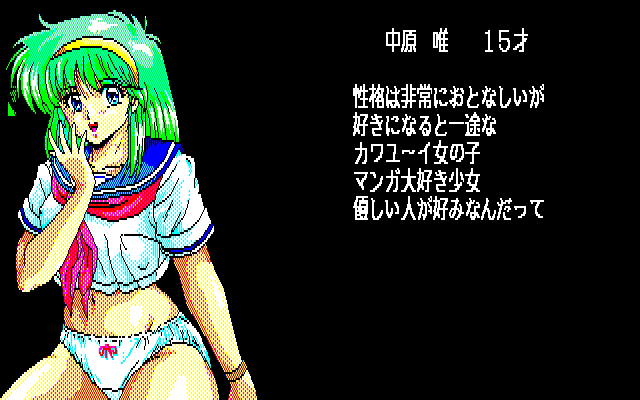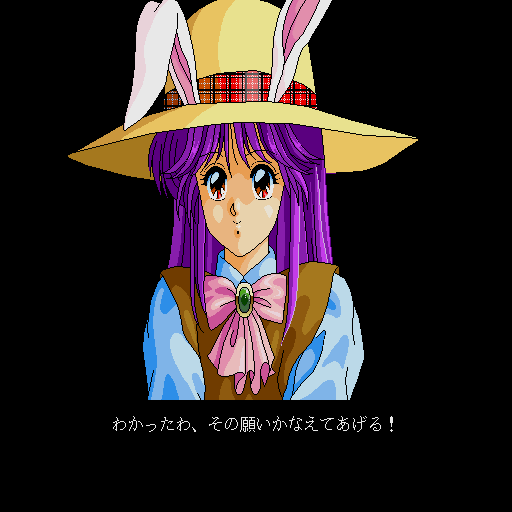Retro Replay Review
Gameplay
Can Can Bunny follows a classic Japanese adventure structure, presenting still images of locations paired with a menu-driven interface. Players navigate through city streets, cafes, and private rooms by selecting options from a concise list. This interface keeps interactions straightforward, allowing newcomers to visual novels and adventure games to dive right in without a steep learning curve.
(HEY YOU!! We hope you enjoy! We try not to run ads. So basically, this is a very expensive hobby running this site. Please consider joining us for updates, forums, and more. Network w/ us to make some cash or friends while retro gaming, and you can win some free retro games for posting. Okay, carry on 👍)
The heart of gameplay revolves around building relationships with five distinct heroines. Through the magic book provided by Ariko, you learn each girl’s preferences and schedule. Purchasing and gifting items is a key mechanic: you’ll visit shops to find what appeals to each character, and successfully giving the right present can unlock deeper dialogue branches and new scenes.
Dialog choices are more than mere fluff—they shape the heroine’s impression of the protagonist. By discussing topics that resonate with her personality, you gradually raise affection levels. When a girl reaches a high comfort threshold, commands such as “kiss the girl” or “touch the girl” become available, allowing you to explore more intimate interactions. The presence of these adult options gives the gameplay a mature edge, though explicit descriptions remain relatively muted.
While the interface may feel familiar to fans of the genre, Can Can Bunny spices up the formula with its fairy-tale framing. The addition of Ariko’s magic book mechanics lends a light quest structure to otherwise open-ended relationship building. Timing your visits, balancing gift purchases, and monitoring each heroine’s interest level all contribute to a satisfying strategic layer behind the romance.
Graphics
The visual presentation in Can Can Bunny leans heavily on character art and expressive portraits. Each heroine boasts a distinctive design, from fashion choices to facial expressions, ensuring they stand out as individuals. Sprites occupy the center of static backgrounds, while close-up portraits convey subtle emotional shifts during key moments.
Backgrounds are rendered in soft, pastel palettes that reinforce the game’s romantic atmosphere. Cafés glow warmly in the evening light, and cityscapes feature neon signs that pulse gently at night. Although locations don’t animate extensively, carefully chosen color schemes and lighting effects create a believable urban playground for your romantic pursuits.
Ariko, the bunny-eared fairy, is illustrated with whimsical charm—her pastel wings and gentle smile provide a visual anchor for the game’s fantastical premise. Occasional visual novel–style special effects, like drifting petals or sparkles when affection peaks, add a layer of flair without overwhelming the senses.
Character portraits are often accompanied by subtle animations—blushes, winks, and head tilts—that bring life to conversations. While the overall graphics engine is straightforward, the quality of individual illustrations and the consistency of the art style elevate Can Can Bunny above many low-budget adventure titles.
Story
At its heart, Can Can Bunny tells a simple yet effective tale of loneliness, hope, and the search for companionship. The protagonist is a shy, dream-filled young man who yearns for a girlfriend but struggles to take action. This relatable setup primes players for Ariko’s entrance—a whimsical fairy who grants him a magical tool to break his romantic inertia.
Ariko’s promise of a single wish manifests as a book listing five potential love interests scattered throughout the city. From the bubbly café waitress to the introspective bookstore clerk, each heroine brings her own backstory and personality quirks. As the protagonist, you guide conversations, select thoughtful gifts, and gradually learn what makes each girl tick.
Despite the simple premise, the story unfolds with unexpected warmth. Casual banter can lead to touching moments of vulnerability, and each heroine’s personal arc feels fleshed out by hints of her daily routines and secret dreams. The magic book serves not only as a gameplay guide but also as a symbol of the protagonist’s growing confidence.
Although the narrative doesn’t stray into complex plot twists, it excels at capturing the highs and lows of budding romance. Whether you’re nervously offering a present or sharing a quiet moment under streetlights, the story remains engaging by focusing on authentic emotional beats rather than grandiose drama.
Overall Experience
Can Can Bunny strikes a comfortable balance between accessibility and depth. Its familiar adventure format makes it easy to pick up, while the relationship mechanics offer enough strategy to keep you invested. Juggling gift selection, conversation topics, and timing creates a rewarding sense of progression as each heroine’s affection meter climbs.
The game’s art and presentation shine in service of its romantic theme. Character designs are memorable, and subtle visual touches enhance emotional moments. While static backgrounds limit environmental immersion, the overall aesthetic remains cohesive and charming, ensuring your focus stays on the characters themselves.
The narrative’s simplicity is a strength rather than a weakness—by zeroing in on the protagonist’s quest for love, Can Can Bunny delivers heartfelt interactions without unnecessary detours. Players who appreciate character-driven stories will find plenty to enjoy in each heroine’s personal journey.
Ultimately, Can Can Bunny provides an engaging experience for fans of Japanese adventure games and dating sims alike. Its combination of light strategic gameplay, appealing visuals, and genuine romantic moments makes it a standout title for anyone seeking a warm-hearted, adult-oriented visual novel adventure.
 Retro Replay Retro Replay gaming reviews, news, emulation, geek stuff and more!
Retro Replay Retro Replay gaming reviews, news, emulation, geek stuff and more!








Reviews
There are no reviews yet.